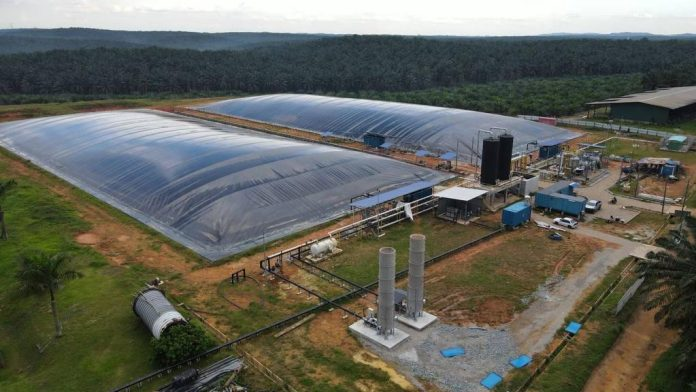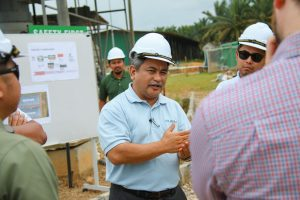
THE Kulim Green Energy Ventures Sdn Bhd (KGEV) is stamping its mark as one of the forerunners in generating biomethane from palm oil waste. It is a renewable energy subsidiary of Johor Plantations Berhad, formerly known as Mahamurni Plantations Sdn Bhd.
The Johor-based company has built the facility on a five-hectare area to capture methane emissions from palm oil wastewater on a commercial scale.
The plant located in Sedenak in the Kulai district is expected to commence operations in the second quarter of this year.
Biomethane is a renewable energy source derived by further purification of raw biogas. It is a promising clean energy source that can be used as fuel for the transportation sector and to generate electricity.
The primary difference between biogas and biomethane is the percentage of methane.
Biogas only has 60% methane while biomethane consists of more than 90% of methane. Biogas is subjected to various purification processes to remove carbon dioxide content.
Speaking to The Petri Dish, Head of the Sustainability & Innovation Division, Wan Adlin Wan Mahmood said: “It is crucial to capture methane in palm oil industries because it is the second largest contributor of methane emissions after the oil and gas industry.”
 Head of the Sustainability & Innovation Division, Wan Adlin Wan Mahmood briefing his colleagues at the plant.
Head of the Sustainability & Innovation Division, Wan Adlin Wan Mahmood briefing his colleagues at the plant.
“It is a damaging pollutant that needs attention because one tonne of methane has the ability to trap 80 times more heat than one tonne of carbon dioxide over a 20 years’ time frame.”
He said methane from palm oil could be largely captured from Palm Oil Mill Effluent (POME).
“POME is discharged wastewater from processing fresh fruit bunches to crude palm oil at the mills. When the wastewater is left untreated in the open, it decomposes organically and emits huge amounts of methane into the air.”
“There are other palm oil industry players who are pioneering in capturing biogas from POME by installing mechanisms to trap methane in its wastewater facilities. However, KGEV has gone a step further by converting biogas into biomethane for productive commercial and domestic usage,” Wan Adlin added.
He said industry players took the initiative to curtail the free leakage of methane into the atmosphere – after the Department of Environment and the Malaysian Palm Oil Board (MPOB) mandated all palm oil mills in the country to install biogas capture facilities in their processing mills.
“This initiative will lend vigour to achieving net zero goals to curtail and manage large scale methane emissions which would otherwise go to waste as a major greenhouse pollutant.”
“In spite of climate goals, there is a price to pay for compliance. For instance, installing and maintaining the facilities to capture biogas will cost around RM1 million annually,” said Wan Adlin.
However, he said methane’s potential as a valuable economic commodity could be monetised in the energy market. This is a win-win largesse, not only for the company but also for global efforts to mitigate climate change.
In 2019, KGEV sealed a purchase agreement with Gas Malaysia Virtual Pipeline Sdn Bhd (GMVP), a subsidiary company of Gas Malaysia Berhad. In the agreement, KGEV will supply biomethane to GMVP – where the output from its facility will be pumped into Gas Malaysia’s Natural Gas Distribution System (NGDS) network for industry usage.
A 12-kilometre pipeline was built from KGEV’s production plant to GMVP’s receiving station to transfer biomethane.
The contract supply period was signed for 15 years.
Wan Adlin said teaming up with Gas Malaysia was a more profitable move because of monetising methane.
“The plant is in the commissioning stage now. Testing and training are ongoing before the facility is ready to roll out as a fully functional system,” said Wan Adlin.
“We believe our investment in building the plant will reap good profit for us because renewable energy is at the heart of the circular economy now and is also a good fix for climate security. This initiative strengthens our commitment to reducing greenhouse gas (GHG) emissions,” added Wan Adlin.
Article originally published in: https://thepetridish.my/2023/04/12/palm-oil-firm-builds-facility-to-recycle-biogas-into-biomethane/